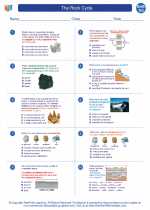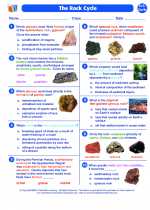Symptom
In the context of Earth Science, a symptom refers to a specific indication or characteristic that is observed and used to diagnose the presence of a particular geological or environmental condition or process. Symptoms can be physical, chemical, or biological in nature, and they provide valuable information to scientists and researchers studying the Earth's systems.
Examples of Symptoms
1. Land Subsidence: The sinking or settling of the Earth's surface can be a symptom of underlying geological processes, such as the collapse of underground mines or the compaction of sediments.
2. Water Discoloration: Changes in the color of water bodies, such as rivers, lakes, or oceans, can be a symptom of pollution, algal blooms, or natural processes like the presence of minerals.
3. Animal Behavior: Unusual behavior patterns in animals, such as migration patterns or feeding habits, can be symptoms of environmental changes, habitat degradation, or climate shifts.
Study Guide
To understand the concept of symptoms in Earth Science, it's important to consider the following key points:
- Observation: Symptoms are often identified through careful observation of natural phenomena, such as changes in the landscape, water quality, or biological interactions.
- Interpretation: Once symptoms are observed, scientists use their knowledge of Earth processes to interpret the underlying causes. This may involve conducting further research, collecting data, and analyzing samples.
- Documentation: Recording and documenting symptoms is essential for building a comprehensive understanding of geological and environmental conditions over time. This may involve creating maps, charts, and databases to track changes.
- Impact: Understanding the symptoms of geological and environmental processes is crucial for assessing their impact on ecosystems, human activities, and infrastructure. This information can inform decision-making and policy development.
By studying symptoms in Earth Science, researchers can gain valuable insights into the complex interactions and processes that shape the planet's surface, atmosphere, and biosphere.
.◂Earth Science Worksheets and Study Guides High School. The Rock Cycle

 Worksheet/Answer key
Worksheet/Answer key
 Worksheet/Answer key
Worksheet/Answer key
 Worksheet/Answer key
Worksheet/Answer key
 Vocabulary/Answer key
Vocabulary/Answer key
 Vocabulary/Answer key
Vocabulary/Answer key
 Vocabulary/Answer key
Vocabulary/Answer key
